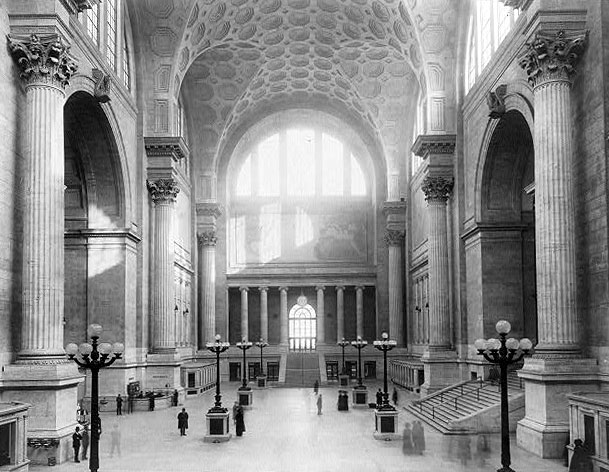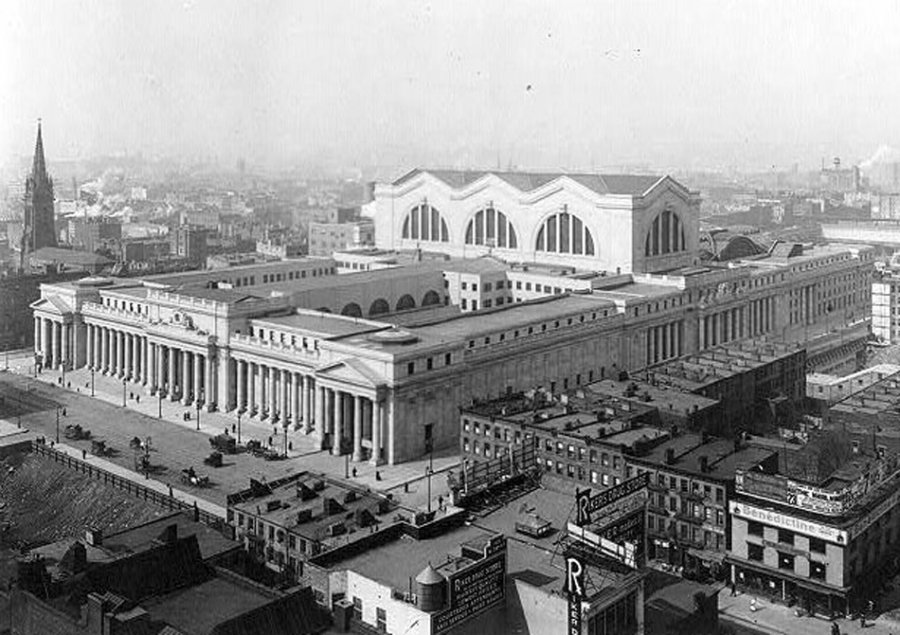|
James McCrea
James McCrea (1848–1913) was the president of the Pennsylvania Railroad from 1907 to 1913. Biography James was born May 1, 1848, in Philadelphia, United States, in a long line of McCreas who came to Delaware and Pennsylvania near two hundred years earlier. His parents were James Alexander McCrea and Ann Bispham Foster. He attended the Pennsylvania Polytechnic College, gaining an education in civil engineering. He began railroad work with the Connellsville & Southern Pennsylvania Railroad in June 1865. In December 1867 he began work on the Wilmington & Reading Railroad, and in September 1868 with the Allegheny Valley Railroad. In March 1871 he began work with the Pennsylvania Railroad as principal assistant engineer working on construction. He advanced rapidly from that point. In 1874 he became assistant engineer of maintenance of way of the Philadelphia Division, then division superintendent of the Middle Division in January 1875, and of the New York Division in October ... [...More Info...] [...Related Items...] OR: [Wikipedia] [Google] [Baidu] |
Philadelphia
Philadelphia ( ), colloquially referred to as Philly, is the List of municipalities in Pennsylvania, most populous city in the U.S. state of Pennsylvania and the List of United States cities by population, sixth-most populous city in the United States, with a population of 1,603,797 in the 2020 United States census, 2020 census. The city is the urban core of the Philadelphia metropolitan area (sometimes called the Delaware Valley), the nation's Metropolitan statistical area, seventh-largest metropolitan area and ninth-largest combined statistical area with 6.245 million residents and 7.379 million residents, respectively. Philadelphia was founded in 1682 by William Penn, an English Americans, English Quakers, Quaker and advocate of Freedom of religion, religious freedom, and served as the capital of the Colonial history of the United States, colonial era Province of Pennsylvania. It then played a historic and vital role during the American Revolution and American Revolutionary ... [...More Info...] [...Related Items...] OR: [Wikipedia] [Google] [Baidu] |
The Pittsburgh Post
The ''Pittsburgh Post-Gazette'', also known simply as the PG, is the largest newspaper serving Greater Pittsburgh, metropolitan Pittsburgh in the U.S. state of Pennsylvania. Descended from the ''Pittsburgh Gazette'', established in 1786 as the first newspaper published west of the Allegheny Mountains, the paper formed under its present title in 1927 from the consolidation of the ''Pittsburgh Gazette Times'' and ''The Pittsburgh Post''. The ''Post-Gazette'' ended daily print publication in 2018 and has cut down to two print editions per week (Sunday and Thursday), going Online newspaper, online-only the rest of the week. In the 2010s, the editorial tone of the paper shifted from Liberalism in the United States, liberal to Conservatism in the United States, conservative, particularly after the editorial pages of the paper were consolidated in 2018 with ''The Blade (Toledo, Ohio), The Blade'' of Toledo, Ohio. After the consolidation, Keith Burris, the pro-Donald Trump, Trump editori ... [...More Info...] [...Related Items...] OR: [Wikipedia] [Google] [Baidu] |
1913 Deaths
Events January * January – Joseph Stalin travels to Vienna to research his ''Marxism and the National Question''. This means that, during this month, Stalin, Hitler, Trotsky and Tito are all living in the city. * January 3 – First Balkan War: Greece completes its Battle of Chios (1912), capture of the eastern Aegean island of Chios, as the last Ottoman forces on the island surrender. * January 13 – Edward Carson founds the (first) Ulster Volunteers, Ulster Volunteer Force, by unifying several existing Ulster loyalism, loyalist militias to resist home rule for Ireland. * January 18 – First Balkan War: Battle of Lemnos (1913), Battle of Lemnos – Greek admiral Pavlos Kountouriotis forces the Turkish fleet to retreat to its base within the Dardanelles, from which it will not venture for the rest of the war. * January 23 – 1913 Ottoman coup d'état: Enver Pasha comes to power. February * February 1 – New York City's Grand Central Te ... [...More Info...] [...Related Items...] OR: [Wikipedia] [Google] [Baidu] |
1848 Births
1848 is historically famous for the wave of revolutions, a series of widespread struggles for more liberal governments, which broke out from Brazil to Hungary; although most failed in their immediate aims, they significantly altered the political and philosophical landscape and had major ramifications throughout the rest of the century. Ereignisblatt aus den revolutionären Märztagen 18.-19. März 1848 mit einer Barrikadenszene aus der Breiten Strasse, Berlin 01.jpg, Cheering revolutionaries in Berlin, on March 19, 1848, with the new flag of Germany Lar9 philippo 001z.jpg, French Revolution of 1848: Republican riots force King Louis-Philippe to abdicate Zeitgenössige Lithografie der Nationalversammlung in der Paulskirche.jpg, German National Assembly's meeting in St. Paul's Church Pákozdi csata.jpg, Battle of Pákozd in the Hungarian Revolution of 1848 Events January–March * January 3 – Joseph Jenkins Roberts is sworn in as the first president of the inde ... [...More Info...] [...Related Items...] OR: [Wikipedia] [Google] [Baidu] |
Members Of The Philadelphia Club
Member may refer to: * Military jury, referred to as "Members" in military jargon * Element (mathematics), an object that belongs to a mathematical set * In object-oriented programming, a member of a class ** Field (computer science), entries in a database ** Member variable, a variable that is associated with a specific object * Limb (anatomy), an appendage of the human or animal body ** Euphemism for penis * Structural component of a truss, connected by nodes * User (computing), a person making use of a computing service, especially on the Internet * Member (geology), a component of a geological formation * Member of parliament * The Members, a British punk rock band * Meronymy, a semantic relationship in linguistics * Church membership, belonging to a local Christian congregation, a Christian denomination and the universal Church * Member, a participant in a club or learned society A learned society ( ; also scholarly, intellectual, or academic society) is an organizatio ... [...More Info...] [...Related Items...] OR: [Wikipedia] [Google] [Baidu] |
19th-century American Railroad Executives
The 19th century began on 1 January 1801 (represented by the Roman numerals MDCCCI), and ended on 31 December 1900 (MCM). It was the 9th century of the 2nd millennium. It was characterized by vast social upheaval. Slavery was abolished in much of Europe and the Americas. The First Industrial Revolution, though it began in the late 18th century, expanded beyond its British homeland for the first time during the 19th century, particularly remaking the economies and societies of the Low Countries, France, the Rhineland, Northern Italy, and the Northeastern United States. A few decades later, the Second Industrial Revolution led to ever more massive urbanization and much higher levels of productivity, profit, and prosperity, a pattern that continued into the 20th century. The Catholic Church, in response to the growing influence and power of modernism, secularism and materialism, formed the First Vatican Council in the late 19th century to deal with such problems and confirm ce ... [...More Info...] [...Related Items...] OR: [Wikipedia] [Google] [Baidu] |
Pennsylvania Railroad People
Pennsylvania, officially the Commonwealth of Pennsylvania, is a state spanning the Mid-Atlantic, Northeastern, Appalachian, and Great Lakes regions of the United States. It borders Delaware to its southeast, Maryland to its south, West Virginia to its southwest, Ohio and the Ohio River to its west, Lake Erie and New York to its north, the Delaware River and New Jersey to its east, and the Canadian province of Ontario to its northwest via Lake Erie. Pennsylvania's most populous city is Philadelphia. Pennsylvania was founded in 1681 through a royal land grant to William Penn, the son of the state's namesake. Before that, between 1638 and 1655, a southeast portion of the state was part of New Sweden, a Swedish colony. Established as a haven for religious and political tolerance, the colonial-era Province of Pennsylvania was known for its relatively peaceful relations with native tribes, innovative government system, and religious pluralism. Pennsylvania later played a ... [...More Info...] [...Related Items...] OR: [Wikipedia] [Google] [Baidu] |
Samuel Rea
Samuel Rea (September 21, 1855 – March 24, 1929) was an American engineer and the ninth president of the Pennsylvania Railroad, serving from 1913 to 1925. He joined the PRR in 1871, when the railroad had hardly outgrown its 1846 charter to build from Harrisburg to Pittsburgh, and helped it grow to a 12,000-mile (19,000 km) system with access to Manhattan, upstate New York, and New England. Rea was elected to the American Philosophical Society in 1913, awarded the Franklin Medal in 1926, and was elected as an honorary member of the Institution of Civil Engineers in 1928. Early life and career Samuel Rea was born on September 21, 1855, in Hollidaysburg, Pennsylvania. His parents were James D. Rea and Ruth Blair Moore. His paternal grandfather, General John Rea, was the United States representative from Bedford and Franklin, Pennsylvania, during the terms of Thomas Jefferson and James Madison. Through the marriage of his father's siblings, he was related to the Asa Childs ... [...More Info...] [...Related Items...] OR: [Wikipedia] [Google] [Baidu] |
Alexander Cassatt
Alexander Johnston Cassatt (December 8, 1839 – December 28, 1906) was the seventh president of the Pennsylvania Railroad (PRR), serving from June 9, 1899, to December 28, 1906. Family and early life Alexander Cassatt was born on December 8, 1839, in Pittsburgh, Pennsylvania. He was the eldest of seven children born to Robert Simpson Cassat (later Cassatt), and his wife Katherine Cassatt, the former Katherine Kelso Johnston. The elder Cassatt was a successful stockbroker and land speculator who was descended from the French Huguenot Jacques Cossart, who came to New Amsterdam in 1662. The Cassatts had seven children, two of whom died in infancy; Alexander's younger sister was the impressionist painter Mary Cassatt. Their mother, Katherine, came from a banking family. She was educated and very well read. It was said that of the seven Cassatt children, Alexander most resembled his mother in "appearance and temperament". In 1856, Alexander Cassatt entered Rensselaer Polytechnic Ins ... [...More Info...] [...Related Items...] OR: [Wikipedia] [Google] [Baidu] |
American Philosophical Society
The American Philosophical Society (APS) is an American scholarly organization and learned society founded in 1743 in Philadelphia that promotes knowledge in the humanities and natural sciences through research, professional meetings, publications, source text, library resources, and community outreach. It was founded by the polymath Benjamin Franklin and is considered the first learned society founded in what became the United States.Philosophical Hall, the society's headquarters and a museum, is located just east of Independence Hall in Independence National Historical Park. In 1965, in recognition of the building's history, it was designated a National Historic Landmark. The society has about 1,000 elected members. As of April 2020, 5,710 members had been inducted since its creation. Through research grants, published journals, the American Philosophical Society Museum, an extensive library, and regular meetings, the society supports a variety of disciplines in the humanitie ... [...More Info...] [...Related Items...] OR: [Wikipedia] [Google] [Baidu] |
Haverford, Pennsylvania
Haverford is an Unincorporated area#United States, unincorporated community located in both Haverford Township, Pennsylvania, Haverford Township in Delaware County, Pennsylvania, United States, and Lower Merion Township, Pennsylvania, Lower Merion Township in Montgomery County, Pennsylvania, Montgomery County, approximately west of Philadelphia. The Pennsylvania Railroad (PRR) opened Haverford station (SEPTA Regional Rail), Haverford Station in 1880 on their Main Line (Pennsylvania Railroad), Main Line west out of Broad Street Station (Philadelphia), Broad Street Station (now Suburban Station) in Philadelphia. Haverford sits at milepost 9.17. Haverford borders the unincorporated portion of Haverford Township called Havertown, Pennsylvania, Havertown, as well as the unincorporated communities of Bryn Mawr, Pennsylvania, Bryn Mawr, Gladwyne, Pennsylvania, Gladwyne, Ardmore, Pennsylvania, Ardmore, Wynnewood, Pennsylvania, Wynnewood, and a small portion of Broomall, Pennsylvania, Bro ... [...More Info...] [...Related Items...] OR: [Wikipedia] [Google] [Baidu] |






